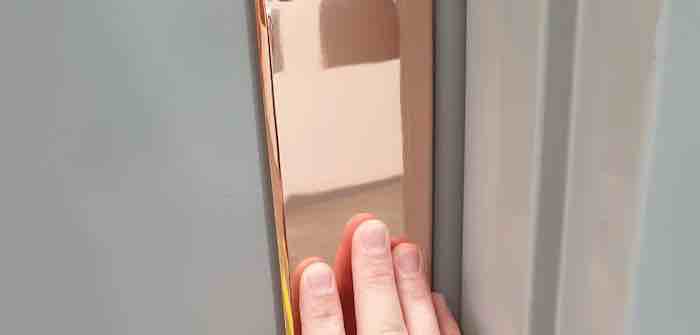 R
Researchers reported that the novel coronavirus causing the COVID-19 pandemic survives for days on glass and stainless steel but dies within hours after landing on copper.
1
This finding shouldn't be too surprising. Copper and copper-alloy surfaces have been shown to kill a number of microorganisms including MRSA, E-coli 0157:H7, Clostridium difficile, influenza A virus , adenovirus and fungi. Independent laboratory testing has demonstrated that, when cleaned regularly microbial copper products kill greater than 99.9% of microorganisms.
2
The benefits of copper and copper alloys have been known for years. Five thousand years ago, the Egyptians used copper to transport water and to heal wounds. Later on, in the 1850s, it was noticed that, during the Parisian cholera outbreaks, the copper workers were not affected. But while in the 20th century copper alloys were used extensively for door handles, push plates, taps or work surfaces, the development of contemporary materials, such as stainless steel and plastics, began to eliminate copper from everyday life more and more.
3
How does copper kill? Professor Bill Keevil explains, “Copper ions, Cu(I) and Cu(II), penetrate into the cell, where they inhibit its respiration. The copper ions also attack the DNA of the cell and destroy it, so gene transfer is no longer possible. In addition, they attack the cell membrane of gram-negative bacteria such as E. coli, so that it becomes permeable and the membrane potential collapses. What we also found is that there is a chemical reaction called the Fenton reaction, whereby Cu(I) and Cu(II) recycling leads to the production of potent reactive oxygen species such as superoxide and hydroxyl radial: these work even faster than the copper ions themselves.”
3
One caution- experts emphasize that having the metal around doesn't let anyone off the hygiene hook. Copper on its own is no cure-all and its effects aren't instantaneous. It takes about 45 minutes for copper to reduce the amount of virus on a surface by half.
4 Still compared to results with other materials, I would much prefer to have copper in my vicinity.
Copper Supplements
A claim is that taking copper supplements can help your body fight an infection caused by COVID-19. The National Academies of Science, Engineering and Medicine reports: Copper supplements cannot prevent or cure a COVID-19 infection.
- There is no evidence that copper kills germs inside your body.
- There is no evidence that copper or other dietary supplements can 'boost' or supercharge' your immune system to protect you from infections.5
Why isn't copper widespread in hospitals?
Even though the benefit of copper on high-touch surfaces has been known for years, hospitals have been slow to implement. One reason is that many medical professionals are unaware of the benefits of copper. Another is cost—copper can be more expensive than other options. It is also more costly to replace existing fixtures and equipment than designing with copper from the start. Bill Keevil reports, “Finally, at least some nations are now waking up to this simple approach to control infection. One example is France where various hospitals are now installing copper fittings.”
6
References
- Jim Morrison, “Copper's virus killing powers were known even to the ancients” smithsonianmag.com, April 14, 2020
- “Research proves microbial copper reduces the risk of infections by more than 90%,” Medical University of South Carolina, July 1, 2011
- Karoline Laarmann, “Copper: The relentless killer on our side,” healthcare-in-europe.com, June 6, 2011
- Katherine J. Wu, “Copper won't save you from coronavirus,” The New York Times, June 19, 2020
- “Can copper supplements fight COVID-19,” sites.nationalacademies.org, May 21, 2020
- Bill Keevil, “Copper is great at killing superbugs—so why don't hospitals use it?”, the conservation, February 24, 2017
 Researchers reported that the novel coronavirus causing the COVID-19 pandemic survives for days on glass and stainless steel but dies within hours after landing on copper. 1
This finding shouldn't be too surprising. Copper and copper-alloy surfaces have been shown to kill a number of microorganisms including MRSA, E-coli 0157:H7, Clostridium difficile, influenza A virus , adenovirus and fungi. Independent laboratory testing has demonstrated that, when cleaned regularly microbial copper products kill greater than 99.9% of microorganisms. 2
Researchers reported that the novel coronavirus causing the COVID-19 pandemic survives for days on glass and stainless steel but dies within hours after landing on copper. 1
This finding shouldn't be too surprising. Copper and copper-alloy surfaces have been shown to kill a number of microorganisms including MRSA, E-coli 0157:H7, Clostridium difficile, influenza A virus , adenovirus and fungi. Independent laboratory testing has demonstrated that, when cleaned regularly microbial copper products kill greater than 99.9% of microorganisms. 2